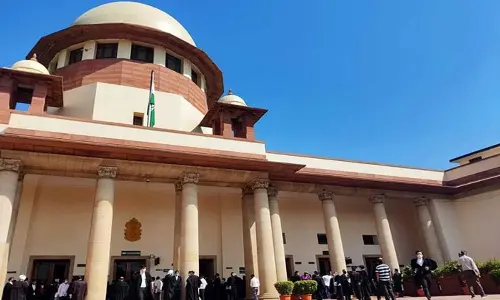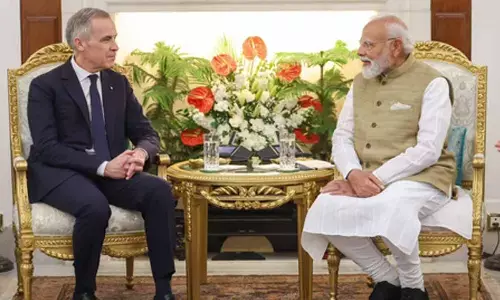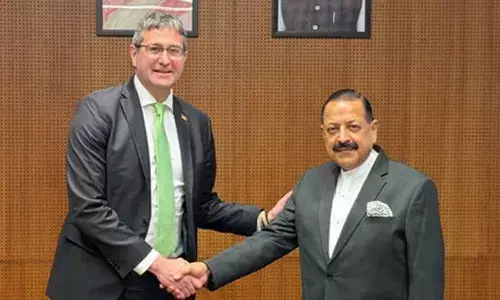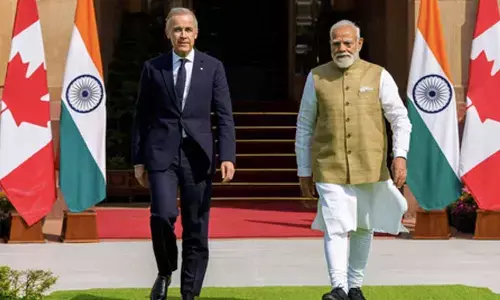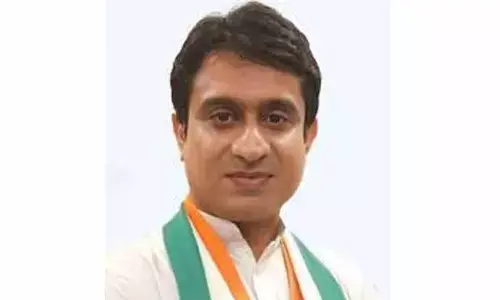MyVoice: Views of our readers 12th March 2023

Views of our readers
Rampant mining harms Karnataka biodiversity
The Karnataka reserve forests in Ballari are at the mercy of profit-driven mining companies. Last year, the Supreme Court lifted a decade-old ban and increased the annual mining limit from 28 million tonnes to 35 million tonnes. Following that, mining companies filed requests to explore minerals in thousands of acres of forest land. As a result, biodiversity hotspots such as the 500-acre Hosapete Reserve Forest, which borders the eco-sensitive Daroji Bear Sanctuary, are under threat.
Kudremukh Iron Ore Corporation Limited (KIOCL) recently registered a 50-year mining lease to explore iron ore in Swamimalai Block Forest and manganese ore in Devadari Hill Range.The terrestrial and scrub forests allocated for excavation cradles diverse species of flora and fauna. The dense ecosystem is home to leopards, sloth bears, black bucks, jackals, wolfs, tigers, lions amongst other thriving wildlife forms.According to reports, the government ignored forest department concerns about a mining proposal by KIOCL in Sandur's virgin forests. Last December the company received final clearance for a project that involves cutting of almost one lakh trees.
While the government has completely ignored the negative environmental impact, there is also no accurate Environmental Impact Assessment. Ballari was the mining capital of Karnataka. When illegal mining depleted natural resources, the Supreme Court prohibited mining in 2011, citing environmental concerns. The hazardous mining waste that was carelessly dumped proved toxic to the environment. It caused massive soil erosion and water contamination, as well as the destruction of agricultural and forest lands.
The chemicals emitted by rampant mining contaminated the air, reducing air quality and endangering citizens' health. Mining activities in ecologically sensitive areas, such as Sandur, have a negative impact on wildlife while causing unnecessary disruption to their fragile habitats. Excessive mining activities in the past have robbed indigenous peoples of their health and livelihoods, while depriving Ballari of its abundant natural resources.
Human intervention in Nature's intricately linked ecosystems will disrupt organic harmony, resulting in irreversible loss of indigenous biodiversity. Time is running out to learn from past mistakes and protect what we have left. As a result, the Karnataka Forest Department must publish an accurate Environmental Impact Assessment and halt mining projects for the sake of our environment and that of future generations.
– Vijaykumar H K, Raichur
Some facts about BBC documentary
For the first time that the UK Government has defended the BBC since the telecast of its controversial documentary on the 2002 riots in Gujarat.It is believed that the IT raids on the offices of the BBC in India have spurred the UK government to take up the issue with the Indian government. Though the allegations leveled by the world's oldest broadcasting house against Modi must be probed for their veracity, our government should not have reacted the way it has.A dispassionate look at the developments in Gujarat post-Godra train burning is the need of the hour which can absolve Modi and others from a feeling of guilt.Here is a look at the entire issue from the point of view of a prominent Muslim leader from Gujarat.
In fact, there is nothing new in the said documentary.It is based largely,among other things,a report sent by the BBC reporter to the British Secretary of State way back in 2002.It never said that Modi had masterminded the bloodshed. Again the visuals and footage used in the documentary were also used and shown by other channels like Channel 4 long ago in 2002,according to Zafar Sareshwala,a prominent Muslim leader from Gujarat.In an interview to a news agency recently,Zafar said many interesting things.
Zafar has been at the forefront of a fight for justice for the carnage victims.He in fact had wanted to move the International Court of Justice in this case.He gave up the idea when he and some other prominent Muslim leaders met Modi in London a few years ago. They talked about the said BBC report sent by their reporter with Modi and asked him why he couldn't stop the murders and violence as the CM of Gujarat.All of us must know what Modi told Zafar and his friends in that meeting.
According to Zafar,Modi returned to Gujarat only in 2001after 6 years in exile.Modi was very happy for the whole hearted support of Muslim voters that made him win the elections.Nobody controlled the prominent Bajarangdal leaders who perpetrated the atrocities,arsonand vandalism during those three fateful days in Gujarat.According to Zafar,Modi felt very unhappy for all the riots and assured the Muslim leaders that he would never allow such things to happen in future.
According to Zafar,after their meeting with Modi in London,many good things happened for Muslims in Gujarat.They were given an active role in the development of the State and the number of hospitals and educational institutions owned and run by Muslim people increased many fold during the Modi's regime there.According to Zafar, their only gripe is that Modi as the CM could have stopped all the bloodshed and all the people who had taken active role in the gruesome events haven't got their just deserts yet.And the BBC's documentary perhaps has tried,in its own way,to project those last two points.
Le Bon talks about crowd behavior in his path breaking study titled, "The Psychology of The Crowd."Mob frenzy is a by-product of our democracy.It often comes into play at the behest of our selfish politicians and causes major ripples in our otherwise placid lives.In our free India,mob frenzy had caused butchery on a large scale on two occasions--one in 1984 and the other in 2002.Our memory may fade,Time may heal our wounds,and courts may give clean chits to our politicians,but our progeny will not forgive us for fatal flaws of frenzy because "All the perfumes of Arabia will not sweeten our little hands."
- M Somasekhar Prasad Hyderabad
Why separate probe into Adani stock rout?
Everybody knows that the apex court has ordered forming of a committee to probe into the regulatory failure in dealing with the allegations that the Adani group companies flouted norms in securities market.
It is difficult to welcome unequivocally the Supreme Court order when the SEBI has already started its probe against this issue. Though the apex court says that constituting a committee will not divest the SEBI of its powers and responsibilities, it will have its own repercussions. However,a relevant question is whether the committee headed by a former Supreme Court judge is needed at all. Instead, the Supreme Court could have closely followed the SEBI investigation and demanded a regular report from it.
The Court also suggested that the committee suggest measures to strengthen the investor protection framework. In fact, it would be a tall order for experts to come up with the measures that can trim in stock market volatility, as volatility is a basic feature of the market and not an abnormality.
The international factors also affect the stock market. Hence, the market is dependent not only on Indian conditions but also more on international factors like recent Russia-Ukraine war and recent Covid.
India has already initiated measures that would protect the minority investors. It is also strange to observe that the apex court has called for the report in sealed cover when the court prefers a transparency in all cases.
– TSN Rao, Hyderabad
Misuse of probe agencies
Things have come to such a pass that we can't think of politics without the Central Bureau of Investigation (CBI) and the Enforcement Directorate(ED). These agencies have become two 'most powerful' entities in our democracy. What they do occupies almost the entire political space and much of the space on TV screens and newspaper pages to the exclusion of the bread and butter issues of politics. It leads to the inevitable conclusion that the blatant misuse of central probe agencies for 'political witch-hunt' is making Indian democracy veer close to 'autocracy.' There is certainly an unmistakable pattern to the raids and investigations carried out by these agencies. It is evident from the selectivity shown by the agencies on pursuing cases that political opponents are specifically targeted to settle scores with them outside of the electoral battle, show them in a poor light and demoralize them. For Opposition leaders who are framed, more often than not at the behest of the government, the process is the punishment. Some TV anchors are so biased and prejudiced that they pronounce guilt without taking care not to prejudge the issue. In any case, it is time public pressure is brought to bear on the government to stop misusing agencies as its tools for political purposes.
G David Milton Maruthancode, Tamil Nadu
Pushing pupils into rat race takes deadly toll
I want to express my deep anguish on the increasing trend of violence and suicides among the youth. The recent murder of Naveen by his close friend from intermediate, Harihara Krishna, has sent shock waves.He is supposed to have watched web series and YouTube shows to commit the 'Perfect Crime.'
The second incident that shocked me was the suicide of N Sathvik, a student of Chaitanya Kalasala, situated at Narsingi. He cited harassment, mental torture, and even physical abuse from the faculty and staff of the college as the reasons for his suicide.While the college should be taken to task and its permission cancelled (the premises purportedly did not have permission from the Intermediate Board) we need to go into the root cause of the issue.
At the forefront are the parents themselves who force their children into CHINA colleges (a short form for Chaitanya and Narayana Colleges) and expect their wards to get into the IITs or bag free medical seats. The college employees, too, face the brunt. They get demands for results from the college management and from the parents themselves. This results in extremely long study hours, strenuous forms of learning by rote the syllabus, fewer sleeping hours, and extreme forms of verbal and physical abuse.
I think it's time that we educate the parents, children, and the colleges themselves that the students are not rats in a race. The youngsters themselves have to learn to behave responsibly and not to take any rash decisions. These rash decisions could lead them, their parents, and society at large to hang their collective heads in shame.
– Dr MAnil Ramesh, Hyderabad
Civic body's incapability cause of stray menace
Gone are the days when people were not scared of dogs which were known for their tameness and harmless nature in coexisting with the public in society. The recent incident on 19th February in Hyderabad wherein a four-year-old boy was attacked and mauled by a group of dogs is a glaring example that tamed dogs are turning wild.
The strange behaviour of these otherwise good going and harmless animals can largely be attributed to the fast and ever growing urbanisation that deprives them of availability of food, water and shelter, turning them restless and abnormal in societal cohabitation with humans. They also turn unrestful due to change in temperature especially during the summerdays.
There are about 5.75 lakh stray dogs which are on the prowl in and around the outskirts of Hyderabad city. It was only after the killing of the child in Hyderabad that the government machinery ha woken up to take necessary action. Every year more than 50 people are succumbing due todog bites in the GHMC limits and also every day more than 200 peopleare visiting the Institute of Preventive Medicine to get anti-rabiesvaccination which is unfortunate and pathetic. Government hospitalsare mostly crowded with dog bite victims every day in the city whichspeaks volumes of the severity of dog menace and the related alarmingsituation arising out of it. In connection with the recent incident, the comments as made by the Mayor of Hyderabad city have caused more angst and concern to the public.Even the High Court has sharply reacted over the bad state of affairsprevailing in the State of Telangana and scheduledthe case for 16th March for adjudication. It is unfortunate thatthere is creeping inefficiency and corruption under the garb ofsterilization of dogs done to control their procreation. It is hightime that a perennial solution was evolved to contain dog menace inthe twin cities of Hyderabad and Secunderabad.
– BhInduSekhar, Hyderabad
Berating one's country abroad is absurd
It is a simple rule of the family that the parents criticise the child inside the house but give fulsome praise outside.
And so goes the old pun: an ambassador is a person who 'lies' abroad for the sake of his country. Any diplomat, politician, or an ordinary citizen has a grave moral responsibility to be kind to his country when talking about it in foreign shores.
But the cheering crowds seem to unbalance our public figures and people cutting across party lines and in different professions have been guilty of it. Stand-up comedian Vir Das having a go at India; PM Modi criticising Indian doctors; and now Rahul Gandhi moaning about the death of democracy in India are some examples. I am no fan of any political party but the biggest problem today with the intellectual, academic, and political combine of the country is that dislike of a party and hate for a person is translating into hate for the entire Hindu community and the country, too. The BJP does not represent the Hindu civilizational ethos and its understanding of Sanatana Dharma is equally poor. It has become successful in consolidating the Hindu vote only because of the consistent anti-Hindu stance of the Congress for seven decades.
– Dr Pingali Gopal, Hanamkonda
Moving towards gender equality
It's well known that for more than a century, people have observed March 8 as a special day for women all across the world.
The day earmarked to celebrate the international contributions made by women in social, economic, cultural, and political spheres. Austria, Denmark, Germany, and Switzerland were the first countries to commemorate International Women's Day in 1911. As the centenary was commemorated in 2011, this year is technically the 111th year of International Women's Day.Since 1975, when it was International Women's Year, the day has been recognised by the UN as an official UN commemoration. Many nations throughout the world also observe it as a national holiday.
The day gives women the chance to stand up for their rights and demand fair treatment and equal chances in all walks of life.
The celebration of International Women's Day is a glaring indicator of advancements made in the direction of generational equity.
It also reveals how far and in what direction society must advance to maximize the benefits.
People are also made aware of how crucial women are to the advancement of humanitarianism and how they should have equal possibilities in society.
Despite the world's tremendous advancements, no nation has achieved gender equality. Women have made immeasurable contributions to the increasingly digital environment in which we live, from the early days of computing to the modern era of virtual reality and artificial intelligence.
In a field that has historically neither embraced nor valued them, they have achieved things that were impossible to expect. The UN International Women's Day theme for this year is DigitALL: Innovation and technology for gender equality. Increased knowledge of women's and girls' rights and civic involvement can be achieved through utilizing gender-responsive innovation, technology, and digital education strategies. Currently, a persistent gender gap in internet access prevents women from fully utilizing technology.
The Sustainable Development Goals of the 2030 Agenda can be achieved with the help of advances in digital technology, which present tremendous opportunities to solve issues of development and humanitarian aid.
– Dr Krishna Kumar Vepakomma, Hyderabad


